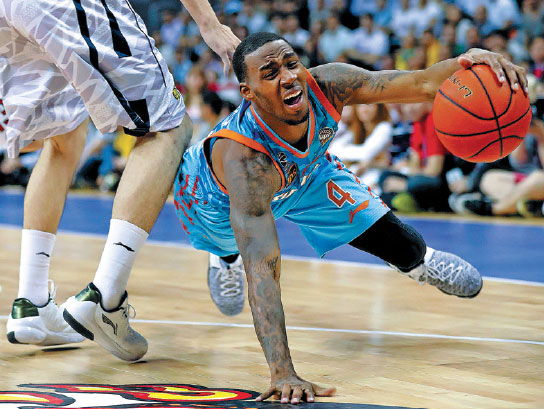Heady days for home hoops
(China Daily) Updated: 2017-04-17 06:41|
Xinjiang star Darius Adams hits the deck during Game 4 of the CBA finals against Guangdong on April 7. Adams starred in the showpiece, averaging 34.8 points to be named MVP and help the Flying Tigers to their first title. Meng Yongmin And Bi Mingming / Xinhua |
Thriving domestic league and Yao's bold leadership bode well for CBA
The winds of change are lifting Chinese basketball to new heights.
The CBA welcomed a new champion in Xinjiang on April 7 while the organization's iconic new president, Yao Ming, has been busy reinvigorating the domestic league and national team.
Xinjiang wrapped up a 4-0 sweep of Guangdong in the best-of-seven final to become the sixth champion in the CBA's 22-year history, joining Bayi, Shanghai, Guangdong, Beijing and Sichuan.
The Flying Tigers' Darius Adams was named MVP of the finals, averaging 34.8 points, while Carlos Boozer led Guangdong with a 27-point average.
This season witnessed some memorable virtuoso performances.
Jimmer Fredette stole the show for Shanghai as the former Sacramento Kings shooting guard recorded an average of 37.6 points to help the Sharks into the playoffs.
Liaoning's Lester Hudson's 31.7-point average was key to his team's march to the semifinals, where it lost 4-1 to Xinjiang.
And it wasn't just foreign stars exciting the crowds. Many young Chinese players stepped into key roles on their respective teams.
Shandong's Ding Yanyuhang averaged 24.2 points to become the only Chinese among the league's top 20 scorers. The 24-year-old was named most valuable domestic player of the regular season as he managed 40 or more points in four games for the Golden Stars, who reached the playoffs.
Xinjiang's Zhou Qi contributed 14.8 points and 9.5 rebounds in the finals. Despite injuring his left thumb in Game 2, the 21-year-old Zhou contributed 18 points and 10 rebounds in Game 4 for the eventual champion.
Other homegrown stars who came into their own were 24-year-old Guo Ailun and Zhao Jiwei, 22, who played crucial roles for Liaoning. Guo contributed an average of 19.9 points, 4.2 rebounds and 4.2 assists, while Zhao was 9.6 points, 3.6 rebounds and 4.2 assists per game.
Meanwhile, Yao, China's only Hall of Famer, has already enacted considerable structural change since his February election.
"The most urgent need now is to reform the CBA league's management and operation so it can attract more investment and attention while enhancing its influence," Yao said after he was installed in the top job.
At the start of April, the CBA gained full control over the sport's governance when the work carried out by the administrative center of basketball, a sub-division of the State General Administration of Sports, was transferred to the association.
The switch means the CBA will be responsible for the management of national teams, leagues, youth development as well as the development of basketball in society.
"This is a great step on the road to reforming Chinese basketball. Meanwhile, we must realize that we still have a long way to go," said Yao.
Elsewhere, Xu Limin has been appointed head coach of the Chinese women's basketball team. Coupled with the growing popularity of the Women's CBA, it's hoped the change will bear fruit at the 2020 Tokyo Olympics.
Xinhua
- 'Cooperation is complementary'
- Worldwide manhunt nets 50th fugitive
- China-Japan meet seeks cooperation
- Agency ensuring natural gas supply
- Global manhunt sees China catch its 50th fugitive
- Call for 'Red Boat Spirit' a noble goal, official says
- China 'open to world' of foreign talent
- Free trade studies agreed on as Li meets with Canadian PM Trudeau
- Emojis on austerity rules from top anti-graft authority go viral
- Xi: All aboard internet express












